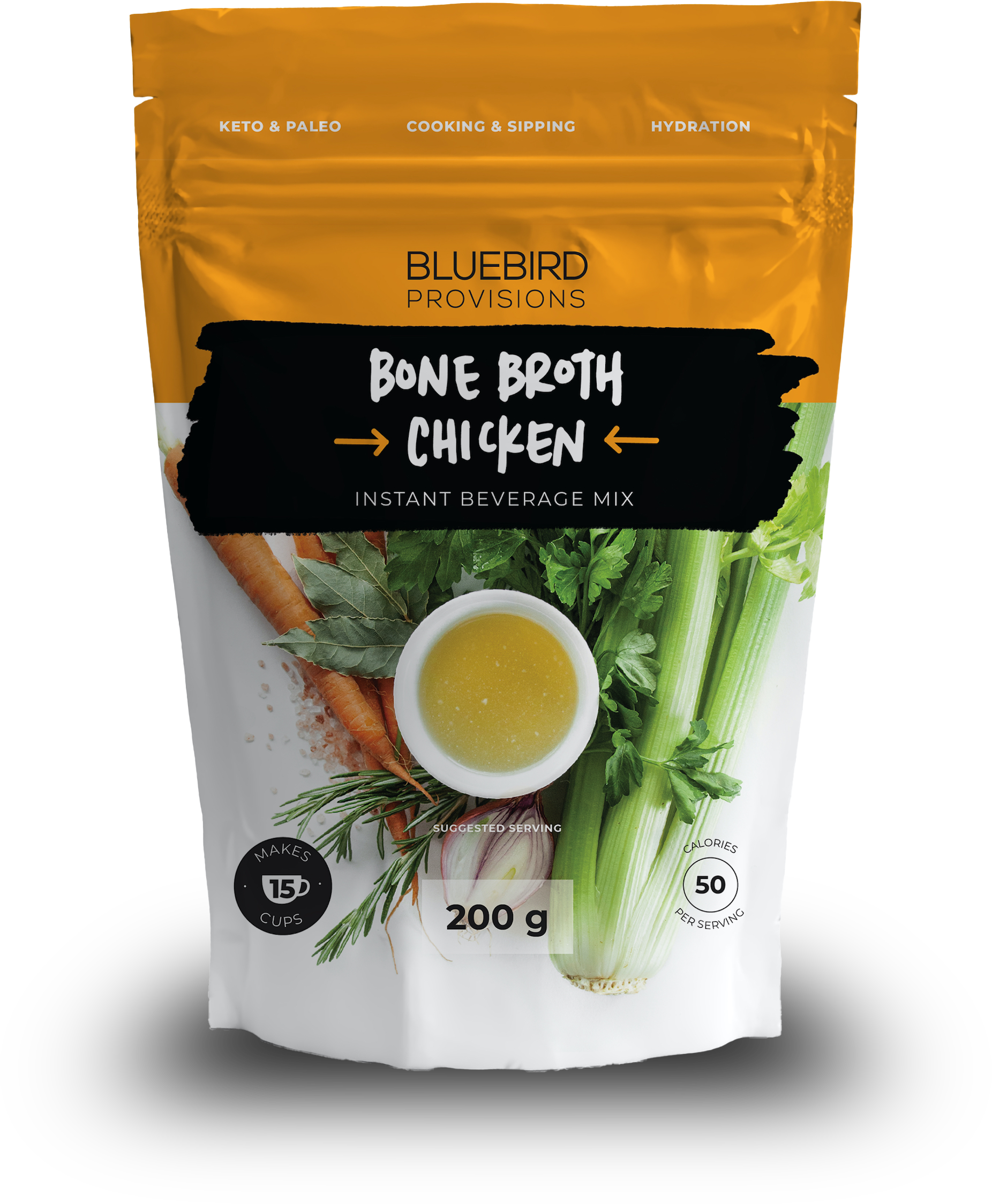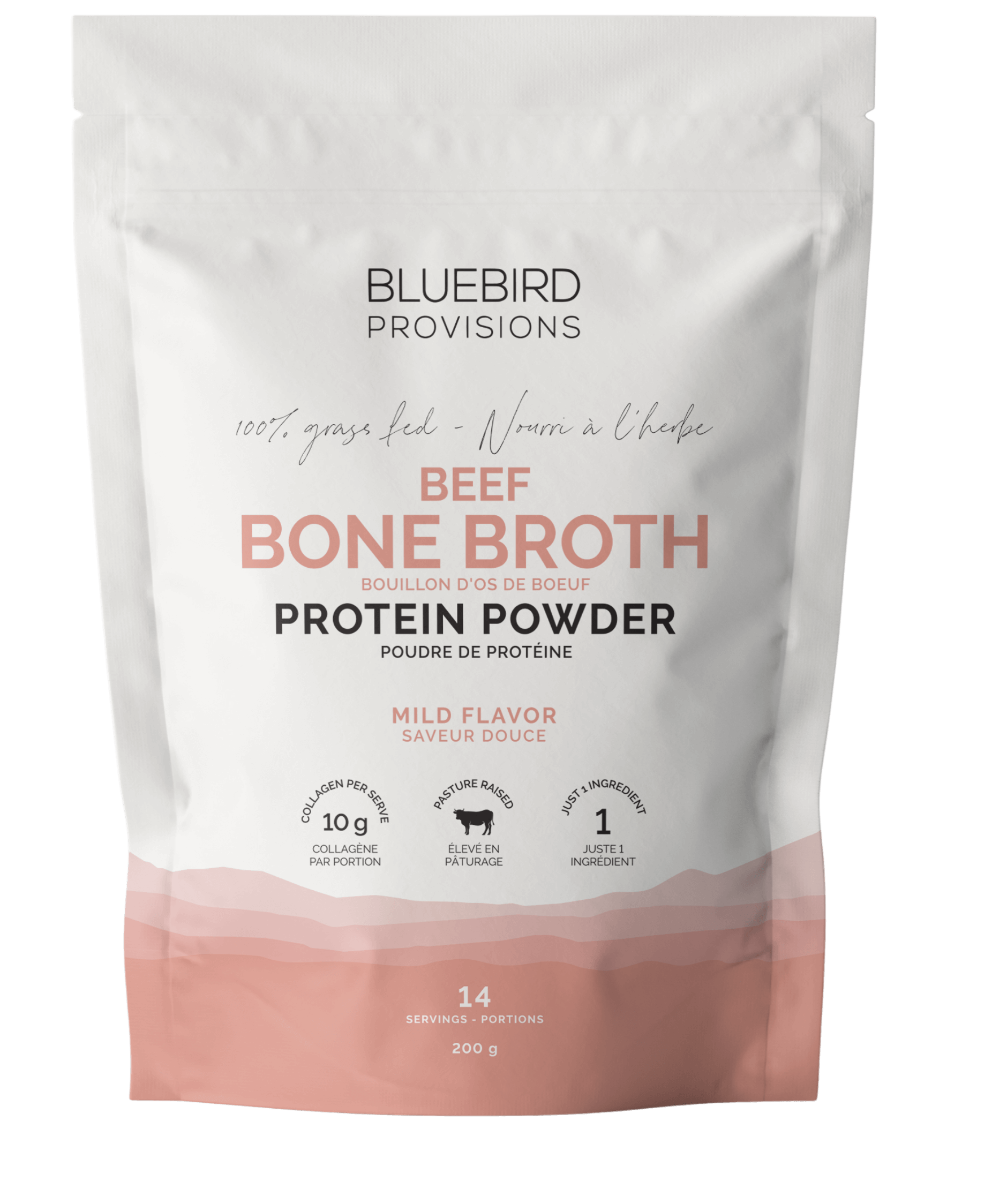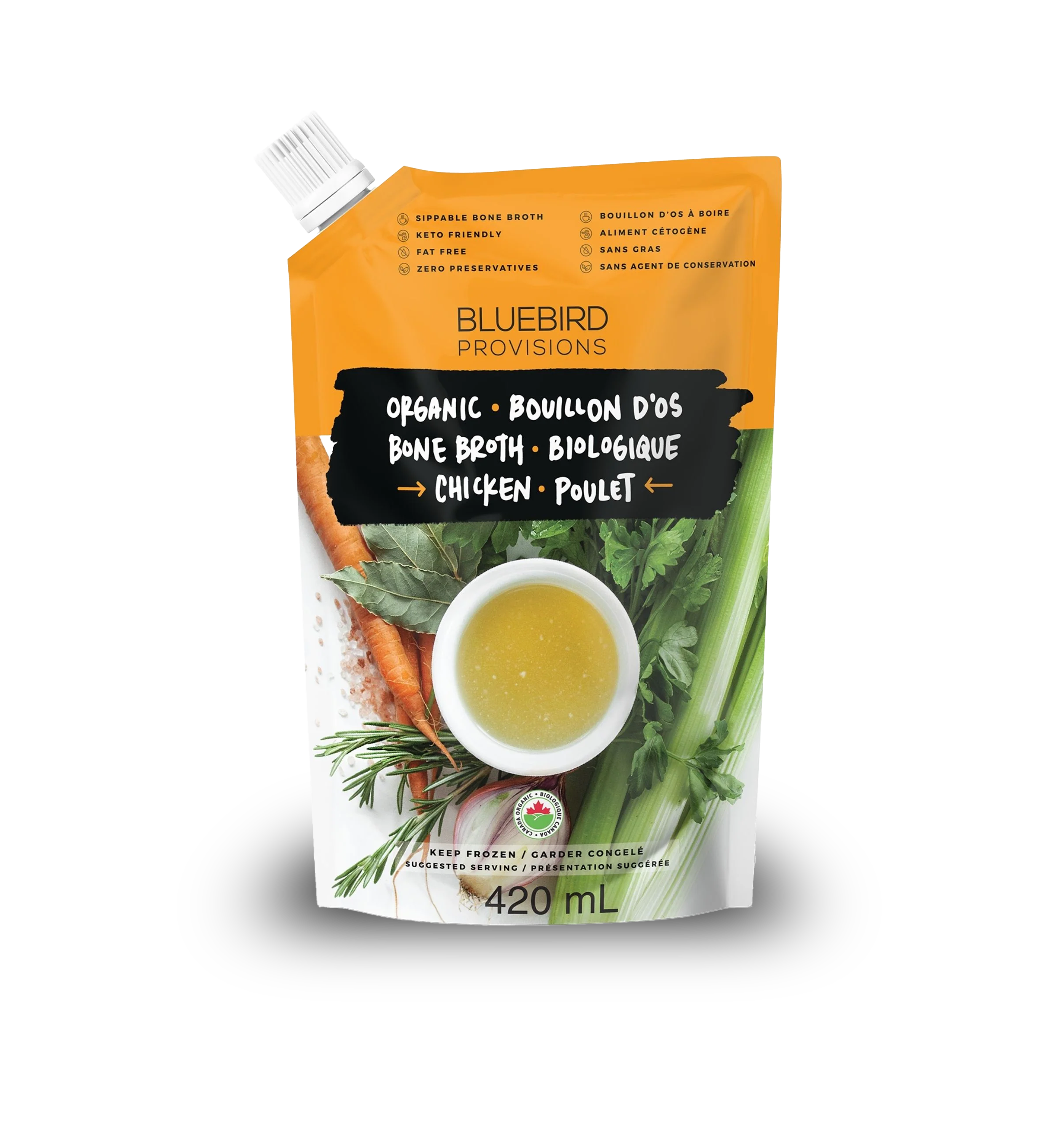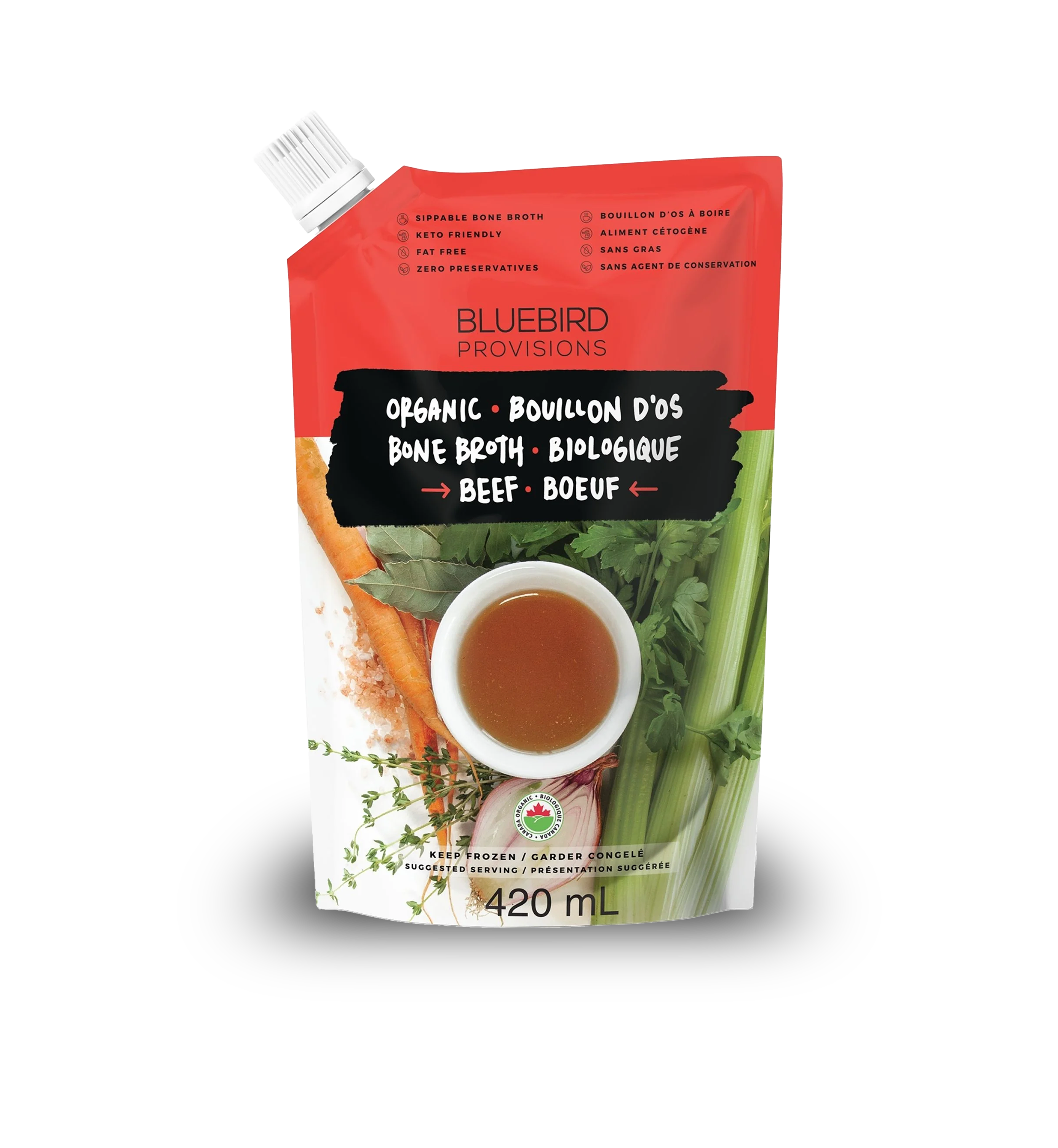
How Much Collagen Per Day: Find the Right Dose and When to Take it
How Much Collagen in a Day
Maybe you've taken collagen for a while now, but you're not sure if you are taking the right amount or at the correct time. Too much or too little can mean wasted money and no results.
There are many different types of collagen on the market, and it can be confusing to know which one to choose and how much to take.
In this article, I'll explain the specific dosing information based on your health goal or ailment plus when is the best time to take collagen for maximum results. Now before we get started, let me mention that I get a lot of questions about what is the best product.
I always recommend getting your daily collagen from real food like bone broth. Why? You need the nutrients from real food for it to digest and absorb properly.
The best one for this is Bluebird Provisions chicken because of the 12 g of collagen protein and low sodium.
Ok, let's get to what you came here for.
How Much Total Protein do You Need
It is always a good idea to know how much total protein you need in a day. This allows you to make sure you are not deficient in total protein before we address collagen specifically.
The tricky thing is that the recommended daily intake (RDA) for protein is outdated and under stated in my opinion. They are based on preventing deficiency, not on promoting an active lifestyle where you actually thrive.
The RDA for an average, sedentary adult is 0.8 grams per kg of body weight. For example, a person with a weight of 200 pounds or 90 kg should aim for 72 g of protein.
I think this number is absurdly low. For example Dr Peter Attia, who is a health and longevity doctor recommends 2 g of protein per kg of bodyweight per day (1).

How to Calculate Protein Intake
You can calculate your protein intake by looking at all of the foods you eat in a given day, adding up the protein to see your total amount in grams. From here you want to convert your weight from pounds to kg by dividing the number in pounds by 2.2046.
Now take your weight in kg and multiply it by 2 to get the number that Attia recommends.
If you are concerned about kidney toxicity or health as it relates to protein intake. Most studies show that you would need to be consuming 3-4 g of protein per kilogram daily before you get into places where your kidneys cannot handle the excess nitrogen.
Learn more about the industry in my deep dive on collagen market size and drivers of growth.
How Much Collagen Compared to Other Protein
How much collagen compared to other protein comes down to your individual goals or needs. Technically, collagen is not defined as a 'complete protein.' Meaning it does not have sufficient amounts of all the essential amino acids for someone to live on if they consumed only collagen as their sole protein source.
That being said, you can include collagen protein in your total daily protein intake number. For someone looking to thrive and perform or fix some health issues, a dose of 10-15 g per day is a great place to start.
- For a 200 lb person, this might represent 8% of your protein for the day.
- For a 150 lb person, collagen might make up 10% of total daily protein intake.
This is a relatively small amount compared to other sources. But other protein sources are easy to get from nuts, seeds, animal protein, dairy and meat. On the other hand, your typical 'Western' diet is low in collagen because we don't eat nose to tail or the right cuts of meat. More on that later in the article.
Looking for a supplement recommendation? Read my guide to finding the best collagen powder for your health.
Factors that affect how much collagen to take per day
How much collagen to take per day depends on lifestyle factors like age, gender, diet, physical activity, goals, environment, stress level and health risks or predispositions.
Read on as I will explain each of these factors below.
1. Age
As we get older, the rate at which we produce collagen starts to fall off a cliff. For women, collagen content gets depleted even faster during and after menopause.

This leads to an increase in the amount of collagen protein powder needed per day as we get older. Additionally, environmental exposures like UV light and pollution can also cause damage to collagen, leading to early wrinkling.
Learn more about how to increase collagen naturally as you age.
2. Gender
Gender does not affect the amount of collagen needed per day. Both males and females can aim for 8-11% of total protein intake from collagen consumption.
Taking the right amount of collagen each day can help promote healthy skin, hair, nails and joints for both males and females. It can also support bone and joint health by helping to maintain strong bones over time.
3. Level of Physical Activity
Physical activity increases the amount of stress placed on your joints, bones, tendons and ligaments. This causes more breakdown and wear and tear. For this reason, I would recommend more collagen is your are doing any activities or sports that involve running or jumping.
Running or similar movements like jumping cause forces or 7 times your bodyweight to go through your joints and tendons. That is a lot to withstand.
4. Diet and Nutrition
Diet and nutrition play a huge role in the amount of extra collagen you need. A balanced, nutritious diet that includes plenty of fruits, vegetables, fish and fatty or grissly proteins is essential for building collagen.
If you are someone who regularly eats what I refer to as 'gelatinous meats' then you may not need to supplement at all. These meats are parts of the animal that require low and slow cooking. Think short ribs, oxtail or a good ol' fashioned beef roast.
The reason they need longer cook times is that there is collagen in the tissue that needs to be broken down to tenderize it
Also, certain vitamins such as vitamin E, C, antioxidants, anthocyanins and copper are essential for the formation of collagen.
Rest my list of the best collagen supplements for sagging skin.
5. Health Goals
Your health goals might have the biggest impact on the amount of collagen you need. Since you are reading this article, I am going to assume that your goals involve more collagen than someone not reading it.
If you want to live longer, feel better and thrive, then you will be on the higher end of daily intake. Supplementation can help get you there if you don't want to do it through diet alone.
6. Drugs
Drugs such as aspirin, ibuprofen, and other non-steroidal anti-inflammatory drugs (NSAIDs) can impact the natural type 1 collagen building process.
This reduces the production of fibronectin, a protein that is essential for the formation of collagen. As a result, the body is unable to repair damaged tissue as effectively and may lead to reduced skin elasticity and increased wrinkles.
7. Environmental factors
Environmental factors that affect how much collagen you need per day include: ultraviolet sun rays, cigarette smoke, pollution, household cleaning chemicals and the presence of smokers will all kill collagen levels. This means you may need more to make up for it.
8. Stress Levels
Stress can cause your body to release hormones that activate your sympathetic nervous system. This ends up causing an increase in blood pressure, heart rate and breathing rate. This results in less blood flow to the skin which can lead to a lack of collagen production and premature aging.
As a result of stress-induced changes in metabolism, the amount of collagen that your body needs per day might increase.
Also, remember that chronic stress leads to free radicals which damage the cells that make new collagen. I realize that much of stress is out of your control.
For this reason you need to protect yourself from stress that you can control.
9. Genetics or Pre-Existing Conditions
There are many genetic predispositions that make us need more or less collagen. Do you notice that you routinely get bone, joint or tendon injuries? This could be genetic meaning that you need more collagen to make up for it.
Also, if you find your'e having skin issues when you feel like you shouldn't be, it could be genetic as well.
How Much Collagen Per Day
How much collagen you should take per day ranges between 2.5 to 15 g depending on your specific goals and needs. For example, the dosage is different if you are healing joint pain vs taking it for skin health.
This info helps when you take into account when to take collagen peptides for best results.
Hydrolyzed Collagen Per Day For Skin Health
To reap the benefits for skin health, the research recommends that you take between 2.5 to 5 grams of collagen per day (2). This amount is shown to increase skin elasticity and hydration in elderly women while reducing the depth of existing skin wrinkles in middle-aged women.
Most of the studies are 6-12 weeks. In my experience, you might notice some differences in as little as two weeks. But you must be patient. It may take up to 12 weeks.
Collagen Protein Supplements For Arthritis and Joints
The daily dose of collagen protein for arthritis and joints is about 10 g (3). I'll note that some studies that focus on tendons and ligaments use 15 g of gelatin instead (4).

If you are suffering from osteoarthritis, the amino acids in collagen help to repair damaged joints by regrowing cartilage and building up new synovial fluid around the joint to buffer the impact.
The important thing is to perform your rehab exercises (best if guided by a physiotherapist) after you take collagen or gelatin plus 50 mg vitamin C. This helps to shuttle the peptide into your joints to reduce pain over time.
Want to know more? Read my in-depth guide on collagen for joint pain and arthritis.
Collagen Protein Dose for Gut Health
Collagen is rich in amino acids, like glycine, proline and hydroxyproline. In fact, they make up approximately 2/3rds of the total protein in it. I bring this up because these amino acids help to heal the connective tissue of the digestive tract.
From a practical perspective, it means that they grow new tissue to replace damaged tissue from years of eating inflammatory food. This helps to heal things like leaky gut or control outbreaks related to IBS, IBD, Crohn's or colitis.
The cool thing is that a recent study using bone broth showed how it can reduce ulcerative colitis flare ups (5).The dose per day is 10-15 g.
You can also use collagen but it might not work quite as well. For more details, you can read my guide to gut health.
How much collagen to take for Bone Health
The research recommends taking 5 g collagen per day for bone health and bone related issues like osteoporosis. You can easily get this much from real food, but I will explain that below.
The studies show that this much collagen over one year can improve bone mineral density, reduce fracture risk and increase bone turnover. Basically your bones are always reforming and this speeds up the process slightly.
Learn more in my master article on collagen for bones.
Daily Collagen Intake For Muscle Strength
If you're looking to increase muscle strength and mass then you need to aim for 15 g of total collagen per day. Keep in mind that you get some from the foods you eat, so you don't need to go out taking tons of expensive hydrolyzed collagen peptides.
The other big caveat is that you need to lift weights or else it will not work. It isn't a miracle drug after all. The main study showed increased muscle mass and strength in men after 12 weeks of weight training (6).
Collagen Intake For Blood Sugar Benefits
Taking 15 grams of collagen per day in the morning or with a carbohydrate rich meal helps to stabilize blood sugar responses and control insulin. How does this work?
It turns out that you can take glycine during the day specifically for controlling blood sugar in those with type 2 diabetes.
One study used 3-5 g of glycine with a carb heavy meal (7). Another recommended taking 5 g in the morning to cut your blood sugar response in half (8).
By taking 15 grams of collagen, you get about 5 g of total glycine since it is about 1/3rd of the total protein in collagen.
How to get Collagen From Food
You can get your daily collagen from food if you do some careful planning and preparation. I've created a chart below which shows you foods with the most collagen.

From a practical standpoint, I will list a few things you can do.
- Eat a variety of fatty animal foods like skin, bones, tendons and ligaments from animals and fish. You can eat skin and bones of small fish like sardines, herring or mackerel.
- Always eat your chicken or pork skin.
- Slow cooked or tougher cuts of meat and joints (wings, drumsticks, oxtail, shanks) are always superior to muscle meats like steak or chicken breast.
- Include foods high in vitamin C, E, zinc, copper (think shellfish), as well as blue, red and purple vegetables for anthocyanins.
- Drink bone broth daily; Bluebird Provisions chicken broth powder is the best one.
- If you need more, add a collagen supplement to your diet in the form of pills or capsules, liquid or powder form.
How much collagen should you take a day?
How much collagen you should take a day depends on your specific goals and needs, but a good starting point is 10 g for 2 months. See how you look, feel and perform on your daily tasks, then you can adjust up or down from there.
As I mentioned above, these are the general doses that we see in the research.
- For skin health, aim for 5 g daily
- For joint pain, try to get 15 g per day
- For bone health, get 5 g daily for one year
- For muscle building you need 15 grams daily
- For blood sugar control, try to get 15 g daily
Is 20 grams of collagen a day too much?
20 grams of collagen a day may be overkill because most studies use doses of 5 to 15 grams. That being said, there are limited downsides to these supplements and they are found in many foods, so you could already be consuming 20g+ per day and not even know it.
Pay attention to how you react to taking powders or peptides. If you have allergic reactions or diarrhea, then collagen may be bad for you personally and you should stop taking it.
But if it is well tolerated then there are no issues taking 20 g.
What happens if you take too much collagen?
If you take too much collagen, you will get bloated and may get cramps and diarrhea. There is no need to worry about harming your kidneys because you'd need to take 100 g of collagen daily for it to affect them.
If you don't get any of the side effects above, you may be wasting your money without getting any benefits. Some people are non-responders to collagen supplement, meaning that they will not get any benefits.
Is there a downside to taking collagen?
Taking collagen supplements may result in gastric symptoms such as an uncomfortable over-full feeling, an unpleasant taste in the mouth and an upset stomach. This is due to the high serving size of collagen which can be difficult for some people to tolerate. Additionally, taking collagen supplements every day may not provide any benefits if taken at a lower serving size then recommended by the manufacturer.
Closing Thoughts
I hope this article helped you understand how much collagen you should take per day based on your specific need. As you can see, the dosage used in research varies a lot.
Also, you can expect to notice different benefits at different times while taking it. Finally, the research is limited and always tends to be years behind what experts are practising in real life settings.
If you're looking for a high-quality, real food source that is superior to collagen peptides, try a high protein bone broth.
I recommend Bluebird Provisions chicken bone broth powder because of the extra amino acids glycine, proline, glutamine, glucosamine and chondroitin. You can find them on Amazon or their website.
How much collagen do you take per day? And what type do you take? Leave a comment and let our community learn what works for you!
Sources
(1) https://peterattiamd.com/category/nutritional-biochemistry/protein/
(2) https://pubmed.ncbi.nlm.nih.gov/32436266/
(3) https://pubmed.ncbi.nlm.nih.gov/18416885/
(4) https://www.ncbi.nlm.nih.gov/pmc/articles/PMC5183725/
(5) https://www.ncbi.nlm.nih.gov/pmc/articles/PMC8618064/
(6) https://www.cambridge.org/core/journals/british-journal-of-nutrition/article/collagen-peptide-supplementation-in-combination-with-resistance-training-improves-body-composition-and-increases-muscle-strength-in-elderly-sarcopenic-men-a-randomised-controlled-trial/9426E375742D094F91029FD0364815C4
(7) https://pubmed.ncbi.nlm.nih.gov/11456285/
(8) https://pubmed.ncbi.nlm.nih.gov/12450897/
Disclaimer: this information is for educational purposes only and has not been evaluated by the FDA or CFIA. It is not intended to diagnose, treat, cure, or prevent any disease. Please consult your primary care physician for advise on any of this.















6 comments
I’m 57 and have always had thin hair but it’s falling out a lot and not just n shower. I’ve been drinking collagen for months now and am up to 40-80 grams a day. Not seeing any results yet might b one of those non-responders you mentioned Hope I’m not wasting my $$.
Dyana Malone
Hi Derek, not that I know of. But it would be really helpful if there was a blood marker you could test for.
Connor at Bluebird Provisions
Hi,
Please, is there an easy way to count your own collagen viz a blood test, screening or whatever?
Thanks – 75 years old Derek Thailand
Derek
I started taking collagen after I had Covid. 3 months after recovering at 55years old I starting losing my hair in the shower more than normal and this was concerning ,side effect of covid in women my age I was told.
Within 2 weeks of 10g of collagen every morning in my coffee my hair grew back. I stopped taking after 2 months. I now have arthritis in my neck that is interfering with my excercise routine. Now at 58 I starting taking again to reap the benefits listed in this knowledgeably article. I will now make collagen a permanent supplement.
Rew
Lisa
Hi Rhonda,
I’ll update the article with when to take it. In the meantime I wrote a separate article on that here: https://bluebirdprovisions.co/blogs/news/best-time-to-take-collagen-peptides
Connor at Bluebird Provisions
When do you take it? I re-read the article and still didn’t find the answer. It was in the title and I feel like I must have overlooked it. Thank you.
Rhonda Smith
Leave a comment
This site is protected by hCaptcha and the hCaptcha Privacy Policy and Terms of Service apply.